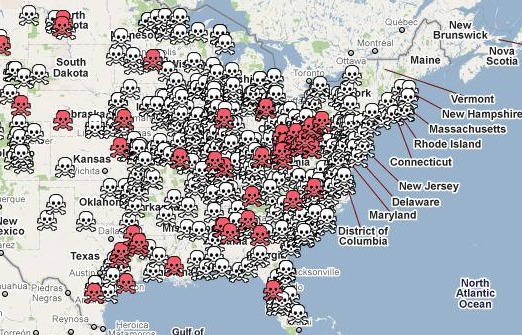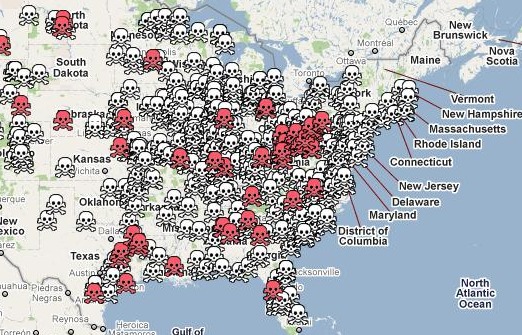 Chances are you’re near one.Image: Sierra Club/Google MapsDo you live around Clearfield, Penn.? The Shawville coal-fired power plant is spewing more than 1,500 pounds of toxic mercury into your air and water every year.
Chances are you’re near one.Image: Sierra Club/Google MapsDo you live around Clearfield, Penn.? The Shawville coal-fired power plant is spewing more than 1,500 pounds of toxic mercury into your air and water every year.
Live near St. Louis? The Labadie coal-fired power plant emits more than 1,400 pounds of mercury every year.
And if you live near Bismarck, N.D. — you have two coal-fired power plants near you (Milton Young and Coal Creek) that emit a combined 1,700 pounds of mercury into your environment annually.
Unfortunately, the list of mercury and other toxin-spewing coal plants is long, but now you can use one of our new tools to find out what’s close to you. We’re excited to announce a new feature — an interactive map that allows users to see the coal-fired power plants nearest to them, to learn more about the toxic pollution and health threats caused by those plants and to sign up to get involved in the local Sierra Club effort to phase out those coal plants and replace them with clean energy.
Our new map shows the approximately 500 existing U.S. coal-fired power plants and currently focuses on toxic mercury, an alarming health threat from coal-fired power plants. Because toxic mercury from coal plants gets into local waterways, every state has warnings against eating fish caught locally. New protections proposed last month by the Environmental Protection Agency would reduce toxic mercury by more than 90 percent, and the Sierra Club is mobilizing Americans in support of the proposed new protections.
This map highlights the beginning of another powerful phase in the Sierra Club Beyond Coal Campaign: Phasing out the nation’s existing fleet of coal plants and replacing them with clean energy sources. As major sources of life-threatening mercury, soot, and smog pollution, existing coal plants are finally coming under increasing scrutiny.
We recently celebrated the defeat of the 152nd proposed coal-fired power plant prevented or abandoned in the past decade.
And the Sierra Club is already working stop the pollution from remaining plants: Earlier this month we were part of an agreement with the Tennessee Valley Authority that requires them to phase out 18 units at dirty, coal-fired power plants and install modern pollution controls on three dozen additional units across Alabama, Kentucky, North Carolina, and Tennessee.
America can replace dirty coal plants with clean energy solutions like energy efficiency, wind, solar, and geothermal to meet America’s energy needs and create jobs. The wind industry already employs more people than the coal mining industry in the United States.
As clean energy deployment continues to accelerate nationwide, we can repeat and greatly expand this economic success by moving beyond coal and opening up new opportunities for innovation and job creation.



